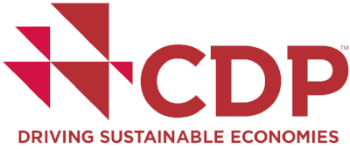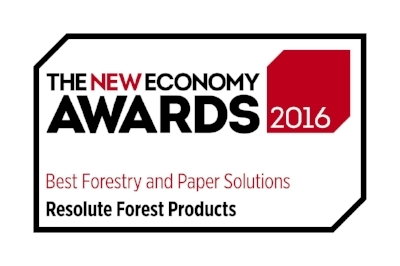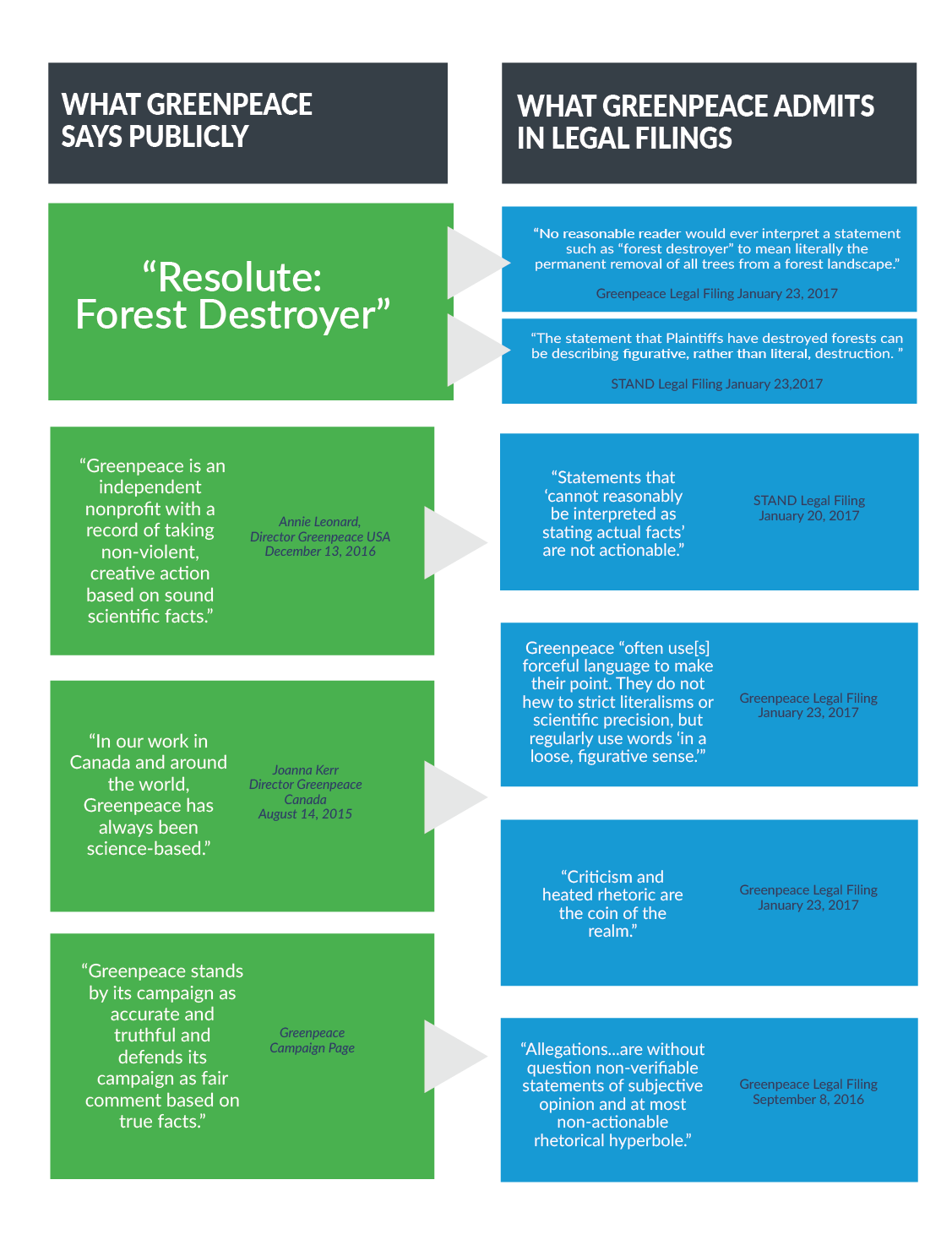Greenpeace “Report” is Misleading, Re-hashed, Dishonest
The activists at Greenpeace are at pains to present a recent “report” on their boreal campaign as a major new work of original research, but in fact the document presents no new information, and merely rehashes the many distortions and falsehoods that have littered their irresponsible attacks on us for years.
Quite simply, Resolute has debunked or answered every substantive specific charge laid out in this document, in great detail, as they arose. And in each case we have done so in full transparent view of the public and the many stakeholders in the boreal. To what result? Numerous credible outlets that have investigated our dispute with Greenpeace and its allies—from the Wall Street Journal to the Washington Post to the National Post to Enquête—have raised questions concerning the group’s mischaracterization of the facts, its questionable tactics, its underlying motivations, or all of the above.
When Enquête, one of Canada’s leading TV news programs, confronted then-Director of Greenpeace Quebec, Nicolas Mainville about falsified images published and then retracted by Greenpeace, he deflected responsibility and responded, “It makes me laugh a bit.”[1]
When the Wall Street Journal asked Greenpeace about its history of distortion and impersonation, Greenpeace USA Executive Director Annie Leonard responded without addressing the specifics.[2]
And if the verdict of outside observers is not enough, consider that Greenpeace itself, when confronted in court about their many mistruths, was forced to concede in legal filings that the claims they made against Resolute were “non-actionable rhetorical hyperbole.” Strongly stated alarmist positions were described as matters of “non-verifiable subjective opinion,” and characterizations of Resolute’s activities in the region were described as “more figurative than literal.”
But let’s review the specifics once more:
On The Boreal and Climate Change
Greenpeace conflates forest management with deforestation. But Canada has strict laws governing the industry, and Resolute meets or exceeds them. Less than 0.2% of the Canadian boreal is harvested each year - twenty-five times less than what is disturbed annually by natural causes like forest fires and disease.[3] As for real deforestation, it’s practically nonexistent. Canada’s deforestation rate is virtually zero at 0.02%, due largely to commercial development and other industrial uses, not the forest products industry.
Greenpeace goes on to insinuate that Resolute’s harvesting operations in some way impair the boreal forest’s ability to absorb harmful carbon from the atmosphere. What they leave out is that harvesting and responsible forest management are recognized and encouraged by the U.N. Intergovernmental Panel on Climate Change to improve carbon capture.[4][5]
Greenpeace also attempts to paint Resolute as an unreliable partner for conservationists, noting as an apparent proof point that the company’s partnership with the World Wildlife Fund (WWF) had ended. But they grossly mischaracterize the natural course of that partnership. Resolute was a member of the WWF Climate Savers Program, a five-year agreement in which leading corporations establish ambitious targets to voluntarily reduce their greenhouse gas emissions (GHGs). In 2011, Resolute committed to some of the most ambitious goals in the industry - a 65% reduction of GHG emission levels by 2015 over 2000 levels. We exceeded our goal by the end of the agreement, and as of the end of 2016, we achieved a 73% reduction. We have also completely eliminated the use of coal on-site. Indeed, we have received North American and global recognition for our commitment to carbon reduction, responsible forest management, and our innovative sustainable development.
On Collaboration with First Nations Communities
Greenpeace claims to respect indigenous communities’ rights to economic self-determination. But many First Nations communities disagree. As Jack Picard, Band Council Member of the Innu Council of Pessamit put it: “Greenpeace, in our view, is an environmental group that goes to the extreme…We are fully capable of speaking for ourselves.”
Partnerships between Resolute and First Nations communities are also left out of the report. Resolute has strong partnerships with over 40 First Nations communities in regions where we operate, and in 2015 signed a historic Memorandum of Agreement with six First Nations partners resulting in $100 million in new business for First Nations communities.[6]
Greenpeace claims daily “collaboration” with First Nations, governments, and unions “to foster . . . healthy local communities,” but omits its many conflicts with those same groups, including the many representatives who have called out to the organization and its allies to stop campaigns that misinform the public and threaten the livelihood of forestry communities. Greenpeace has ignored stakeholders including First Nations communities, federal and provincial government officials, industry associations, and union leadership representing thousands of employees and retirees.
On Stakeholder Engagement
Greenpeace’s pretense at engagement and accountability is more than just dishonest, it’s insulting to the thousands of stakeholders who have reached out in good faith, imploring an end to the dishonest campaigns causing real harm to boreal communities.
Is it any wonder that, as the National Post reported, Greenpeace personnel need to disguise their identity when they travel in boreal forest communities?[7]
Resolute works with a wide range of stakeholders including First Nations communities, customers, employees, environmental and other non-governmental organizations ((E)NGOs), business partners, government officials, investors, and the general public every day.
On “Threatened Species Habitat” in the Boreal
Greenpeace insinuates that Resolute’s activities harm at-risk caribou populations. But almost 75% of the woodland caribou range is off limits to the forest products industry in the areas we operate, and in the area that is accessible, 38% in Quebec and a further 34% in Ontario have been set aside for conservation and other purposes.[8]
On Free Speech, “Suppress[ing]…Facts” and “Silencing” Critics
Greenpeace wrongly characterizes our lawsuit in U.S. federal court as an attack on the First Amendment. The lawsuit stems from the federal Racketeer Influenced and Corrupt Organizations (RICO) Act. Free speech does not protect libel and slander.
Greenpeace and their allies are trying to have it both ways. When defending their statements in Court, they refer to them as “non-verifiable statements of subjective opinion.” When it comes time to fundraise, these same statements are passed off as “facts.” Here is a link to our complaint.
Greenpeace also claims our suit is a “deliberate effort” to push them out of the public discourse. But the reality is that the litigation specifies actual harm that Greenpeace has caused — damage that Greenpeace itself has claimed exceeds $100 million.
On Doing Business with Resolute
Greenpeace has the tremendous gall to call out publishers for working with a “controversial company linked to the destruction of intact ancient forests” when the only groups claiming controversy are Greenpeace and its allies. The truth is that the boreal is not in any scientifically relevant sense “ancient”, and according to the United Nations, is in no way “endangered.” Resolute has been internationally recognized for its environmental stewardship and responsible practices in the region.
Greenpeace’s “report” adds up to almost nothing, comprised entirely of warmed over errors that we have already corrected elsewhere. It does nothing to address our serious legal charges, to account for the harm pointed out by so many independent journalists and boreal stakeholders, or to genuinely advance the conversation on sustainability in North America.
Standing up against false statements, threats and intimidation is a moral obligation. That obligation includes supporting our customers, stakeholders and the communities that live and work in the boreal, who stand with us.
[1] 2016. Resolute Forest Products Blog. TV Newsmagazine highlights Greenpeace misinformation. http://blog.resolutefp.com/2016/04/tv-newsmagazine-highlights-greenpeace-misinformation/
[2] 2016. The Wall Street Journal. The Case Against Greenpeace. https://www.wsj.com/articles/the-case-against-greenpeace-1466203663
[3] 2014. Government of Canada-Natural Resources Canada. The State of Canada’s Forests: Annual Report 2014. http://cfs.nrcan.gc.ca/publications?id=35713
[4] 2016 Resolute Forest Products Press Release. Resolute Files Racketeering Suit Against Greenpeace in U.S. Federal Court. http://resolutefp.mediaroom.com/2016-05-31-C-O-R-R-E-C-T-I-O-N-from-Source-Resolute-Forest-Products-Inc
[5]2007. Intergovernmental Panel on Climate Change. Contribution of Working Group III to the Fourth Assessment Report of the Intergovernmental Panel on Climate Change, 2007. https://www.ipcc.ch/pdf/assessment-report/ar4/wg3/ar4-wg3-chapter9.pdf
[6] 2015. Resolute Forest Products Press Release. Resolute Celebrates Ground-Breaking MOA with Six First Nations. http://resolutefp.mediaroom.com/news-releases?item=135452
[7] 2015. Financial Post. Battle for the Boreal.
http://business.financialpost.com/features/battle-for-the-boreal-forest-2
[8] 2016. Resolute calculations. Detailed calculations available upon request. Results from Resolute Geographic Information Systems (GIS) mapping analysis conducted in Ontario and the Fiche Thématique de Québec from the Quebec Forestry Office. http://www.ec.gc.ca.indicateurs-indicators/default.asp?lang=en&n=8390800A-1#pa3
Companies Should Stand Up To Shakedowns From Activists Like Greenpeace
When activist groups come knocking, the instinct for most corporate leaders is the well-worn path of least resistance. Appease, roll over, give in. Mollify the pot-banging rabble, and shoo them on to the next target down the street.
It’s a menacing pattern that has become so brazen; a common experience among so many leading global companies. The cycle of abuse works like this: use misleading campaigns, vague demands, constantly moving goalposts and an utter lack of scientific grounding, all while using “heated rhetoric” to induce donations. Companies are faced with a choice: capitulate or have their brand identity trashed with smears and false claims.
One of the largest and most aggressive of these groups, Greenpeace, uses a technique it calls “brand-jacking” to assume the identity of popular brands then steer them toward infamy. On its website, Greenpeace brags about how quickly even major companies capitulate, even though the disparagement campaigns remain in full view. Its list of targets reads like a who’s-who of leading companies.
[...]
But when Greenpeace and its allies targeted our company, we decided to draw the line, unapologetically and forcefully defending our integrity.
The Crisis Creation Business
Our company, Resolute, is one of North America’s largest forest products producers...Everything we make relies on one of the world’s most renewable natural resources: trees. Yet despite the many North American and global awards we’ve won for our sustainability leadership, Resolute has been at the center of a cynical, multi-year attack campaign by large, well-funded activist organizations led by Greenpeace and its allies.
While there are conscientious non-governmental organizations with a virtuous cause, others like Greenpeace and its allies exist solely to employ pressure tactics and fundraise off garish publicity stunts. They are, quite simply, in the crisis creation business.
That’s precisely why we felt compelled to stand up to the eco bullies in the first place. It’s one thing for activist groups to participate in the discourse. But it’s quite another to brazenly threaten us and our customers with a nebulous list of imagined crimes that have no measurable, accountable connection to reality. But that’s just the model Greenpeace and partner groups rely on to sustain the self-perpetuating fundraising juggernaut they’ve become.
To give you a sense of what I’m talking about, worldwide, just considering Greenpeace alone, total revenues in 2014 were in excess of €297 million, equivalent at the time to U.S. $409 million. More than one third of that amount—U.S. $147 million—was eaten by “fundraising expenditures” with another U.S. $63 million going to salaries, benefits, and operating costs.
That doesn’t even include the cost of maintaining and operating a big box of expensive, carbon-emitting corporate toys that include helicopters and a small fleet. To cover this much overhead, they have no choice but to use their remaining budget for campaigns with the highest proven fundraising potential.
The pattern of engagement is always the same because most activist campaigns run using the same playbook, which can include tactics like impersonating employees, misrepresenting or doctoring photographs, an endless supply of silly publicity stunts, and selectively using pseudo-scientific findings. Greenpeace accidentally drew the curtain back on these tactics a few years ago when they famously circulated an unfinished activist “fact sheet” stating, “Fill in alarmist and armageddonist factoid here.”
Appeasement Only Expands Their Power
For too many executives, the goal in dealing with bad actors like this is to appease and accommodate, to avoid any hint of controversy, to keep the target off their backs. Never mind that irresponsible activists are making up facts or acting for unprincipled and self-serving motives. It’s easier to give in, pay up, and appease.
But there is no substitute for doing the right thing. In this case, “not to condemn is to condone.” As business leaders, we have a collective responsibility not only to protect the future of our companies, but also to defend the long-term futures of our home communities and the livelihoods of our employees. These are some of the cornerstone principles of good corporate governance.
That’s why we sued Greenpeace and its allies last May under federal RICO laws. As tends to happen with bullies, as soon as we forced them to back up their claims, they are already starting to change their tune. After years of claiming Resolute “destroyed forests,” for instance, Greenpeace and its partners now admit in court filings that this accusation was “figurative rather than literal,” “rhetorical hyperbole,” and “non-verifiable statements of subjective opinion.”
Greenpeace and their allies have naturally resorted to rhetorical contortions to explain these sudden reversals, including claiming the mantle of free speech martyrs. It’s unlikely to work. False statements knowingly made are not free speech in a court of law or public opinion. Naturally, Greenpeace sent a fundraising email to its followers calling our litigation “the biggest threat in [our] 45-year history.” It followed up last week with a fundraising video saying the court action could “sue Greenpeace out of existence.”
A great and diverse range of stakeholders and partners have publicly spoken out to support Resolute’s principled position, from unions and workers, regional and national elected officials, First Nations aboriginal communities, and ordinary citizens. They have written letters, engaged in direct mail campaigns, participated in town hall meetings, and even demonstrated in the streets. Impressively, more than 500 municipalities have gone on record, formally taking a stand against activist misinformation.
Resolute is standing with our stakeholders and partners because it’s a moral and ethical obligation. We’re surely not alone. Other companies have demonstrated their own commitment to responsible and sustainable performance and they too should demonstrate the courage of their convictions.
Seth Kursman,Vice President of Communications, Sustainability & Government Affairs at Resolute Forest Products, The Federalist (5/15/2017)
Greenpeace finally realizes its attacks on Canadian communities have consequences
NRDC Continues Pattern of Intellectual Dishonesty and Ignores Concerns of Boreal Communities in Latest Blog Post
Ignoring concerns from people who actually live in the region they claim to be defending, NRDC has published another misleading blog post, this time about imaginary discrepancies in how Canadian forestry is regulated.
Activist Hypocrisy Hurts Canadian Communities
While Greenpeace and its allies busy themselves with rhetorical gymnastics, they continue to display stunning hypocrisy when it comes to First Nations and other boreal communities.
Greenpeace admits its attacks on Resolute were ‘non-verifiable statements of subjective opinion’
Greenpeace and its allies have been waging a campaign based on the false claim that Resolute Forest Products is "destroying" the boreal forest. Now, they're admitting that their campaign amounts to "hyperbole" that doesn't adhere to “strict literalisms or scientific precision". In other words, exaggerations and lies.
Greenpeace publicly insists its claims are factual, but now, in formal legal filings in US Federal Court, calls its campaign more “figurative than literal” and blames the public for believing their “non-verifiable subjective opinion[s].”
Greenpeace is using claims about Resolute that it admits are not true to raise money from unaware donors. We have an obligation to set the record straight.
At Last, Greenpeace Admits to ‘Rhetorical Hyperbole’
A few years ago Greenpeace and allied groups chose my company, Resolute, Canada’s largest forest-products company, to be their next victim.
They compiled a litany of outlandish assertions: We were “forest destroyers,” for example, aggravating climate change, and causing a “caribou death spiral and extinction” in Canada’s boreal habitat. Greenpeace harassed companies we do business with, threatening them with the same sort of smear campaign that they launched against us and even instigating cyber-attacks on their websites. And they bragged about the damage — $100 million, in Canadian dollars — that they claimed to have inflicted on our business.
They were lying about our forestry practices, so we did something that none of the group’s other targets have yet found the wherewithal to do: We sued them, in Canada, for defamation and intentional interference with economic relations, and in the United States under RICO statutes.
A funny thing happened when Greenpeace and allies were forced to account for their claims in court. They started changing their tune. Their condemnations of our forestry practices “do not hew to strict literalism or scientific precision,” as they concede in their latest legal filings. Their accusations against Resolute were instead “hyperbole,” “heated rhetoric,” and “non-verifiable statements of subjective opinion” that should not be taken “literally” or expose them to any legal liability. These are sober admissions after years of irresponsible attacks.
No “forest loss” was caused by Resolute, the groups concede — now that they are being held accountable. Of course, these late admissions are consistent with the findings of just about every independent journalist and commentator who has covered the dispute, from the Wall Street Journal editorial board to Enquête, a Canadian version, roughly, of 60 Minutes. Even Steve Forbes weighed in, calling our lawsuit “an outstanding example of how unfairly attacked companies should respond.” Peter Reich, one of the world’s leading forest ecologists, has said that Greenpeace has “a fundamental disregard for scientific reality.”
Finally hearing the truth from Greenpeace itself is vindication, even if it comes in the form of a tortured defense of its actions, rather than a simple apology. Remarkably, despite admitting in court that its rhetoric against Resolute is not true, Greenpeace continues to disparage us publicly and privately. Just a few weeks ago, we sent it a cease-and-desist letter demanding that it stop sending to our customers threatening letters accusing us of the “destruction of forests in Quebec and Ontario.”
Some news outlets in the United States have filed amicus briefs on behalf of Greenpeace, on free-speech grounds. But freedom of speech is not the same as libel and slander. And the public should ask the outlets when it can expect scrutinizing, critical coverage of what Greenpeace itself now admits are deceptive practices.
...
So far they have acted with virtual impunity and profited handsomely. One Greenpeace executive was even caught laughing on camera when he was confronted on a leading broadcast program with photos of a forest, affected by a wildfire, that the group erroneously said was “destroyed” by Resolute. It was morally wrong and yet another example that, as Greenpeace puts it, “heated rhetoric is the coin of the realm.”
For me, confronting this barrage of misinformation has been more than just about business ethics. It is very personal. I was raised in Quebec’s Saguenay–Lac-Saint-Jean region, where my family has lived for generations. I harvested trees by hand to pay my way through school. Now 50 years later, those forest areas are again ready for harvest, and someday I will retire to this same land that my great-grandfather tilled.
Greenpeace is marauding not just our company but a way of life, one built on nurturing healthy forests that are the lifeblood of the people who live there. That’s why union leaders, small-business people, First Nations chiefs, and mayors and other government officials, of all political stripes, have written Greenpeace, imploring it to halt its campaign of misinformation. In nearly every instance, Greenpeace lacked the simple decency to respond, apparently indifferent to the human consequences of its actions.
Last summer, nearly 5,000 people marched through the streets of the small northern Quebec town of Saint-Félicien, demanding an end to Greenpeace’s disingenuous market campaign. Recognizing that the very viability of their communities are now held in the balance, local leaders have even “extended a hand” for eco-activists to have a dialogue with them. It is telling that Greenpeace neither showed up nor responded.
As a chief executive, I often meet and engage personally with our devoted employees at the local level, in the forests where they live and work. I know we share a common interest and a responsibility to sustain the forests for tomorrow. That’s why we’re not going to let Greenpeace get away with using “rhetorical hyperbole” to make false and damaging accusations from hundreds and thousands of miles away, in its glass-walled towers in Amsterdam, Hamburg, and Washington, D.C.
We’re going to stand tall, both in public discourse and in the courts. For my part, my guiding hope is to return to the forest with the ability to face my neighbors, my family, and my community and tell them that I stood up and told the truth.
Richard Garneau, President & CEO of Resolute Forest Products, National Review Online (3/2/2017)












